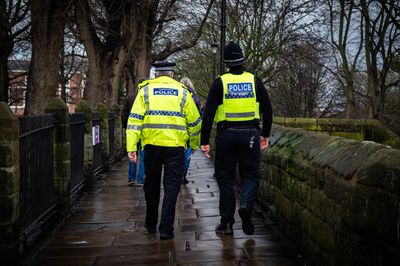£1million cash boost to tackle anti-social behaviour in Cheshire
Published:
Read Time: 3 mins
Residents across Cheshire will see an increased visible presence of officers and Police Community Support Officers (PCSOs) at various times throughout the day and night.
Newly-elected Police and Crime Commissioner (PCC) Dan Price has launched a new project which sees £1million of Government funding used to tackle anti-social behaviour hotspots in Blacon, Ellesmere Port, Winsford, Crewe, Macclesfield, Halton Lea (Runcorn), Fairfield and Howley (Warrington) and Appleton (Widnes).
These hotspots have been selected as the areas experiencing the highest volumes of serious violence and anti-social behaviour (ASB) offences and based on local intelligence.
Following confirmation of the funding earlier this year, the project has now been launched in Cheshire, which enables the Constabulary to deploy additional patrols to target eight hotspot areas in the county.
Patrols will take place at different times throughout the week, with identified areas benefitting from 2-3 days’ worth of extra policing, every week for the next 12 months. Two officers per area will be on foot patrol for a minimum of 6 hours each day and they are tasked with engaging with the public and focussing on addressing ASB.
‘Anti-social behaviour’ is a broad term which includes behaviour which has caused or is likely to cause harassment, alarm or distress to a member or members of the public. Criminal and non-criminal behaviours such as littering, vandalism, public drunkenness, aggressive dogs or noise nuisance may also be considered as ASB.
During the next 12-months, monthly monitoring will be underway and submitted to the Home Office. Outcomes which will be reported on include, hours of visible foot patrols, weapons removed from our streets, number of arrests, number of ASB powers implemented and number of stop searches.
Police and Crime Commissioner, Dan Price said:
“I know anti-social behaviour can have a serious impact on the quality of life of residents, who want to go about their daily lives. During my campaign, I heard from residents about issues of anti-social behaviour, and I’ll look forward to hearing more from them in future about how this investment is working to make a difference. I hope it will have a positive impact in our communities.
“Tackling anti-social behaviour isn’t something the police can do alone, and this funding will enable both the Constabulary and I to work alongside our partner agencies to tackle this issue.
“The increased visibility will help not only deter those who are acting in an anti-social manner, but also catch those in the act. If you see any issues of ASB in your area report them to the police which will enable them to build up their intelligence on the issue.”
Superintendent and Force lead for prevention, Sarah Heath said:
“It is fantastic that the Constabulary has been able to work alongside the PCC to secure this funding. The funds will enable us to target key areas across the county with officers on foot patrol in hot spot areas and ensure officers are actively engaging with the public of Cheshire.
“This additional officer presence will enable us to provide visible reassurances, assist in reducing crime and anti-social behaviour and improve opportunities for supporting our local communities. We see this as a valuable investment into Cheshire and we are already seeing the positive impact after only a few weeks, with some great feedback from residents who have spoken to our officers.”
In March 2023, the Government published the new Anti-Social Behaviour (ASB) Action Plan, and subsequently the ASB Hotspot Response, ensuring an enhanced police presence in identified hotspot area with high levels of serious violence and ASB.
Following this publication, 10 pilot schemes were conducted nationally, which resulted in 800 arrests, close to 2,000 stop-and-searches and approximately 700 uses of anti-social behaviour powers.
You can report ASB by:
- In non-emergency situations calling 101
- In emergency situations calling 999
- Via the Constabulary’s website
Ends
Editors notes
Public accountability for the delivery and performance of the police service is placed into the hands of the Police and Crime Commissioner (PCC) on behalf of the electorate.
The Commissioner has wider responsibilities than those relating solely to the police force, including:
• The ability to provide or commission services intended to help victims and witnesses of crime and anti-social behaviour. • The ability to provide or commission services that will secure, or contribute to securing, crime and disorder reduction. • The ability to bring together Community Safety Partnerships at the force level. • A duty to ensure that all collaboration agreements with other Commissioners and forces deliver value for money or enhance the effectiveness of policing capabilities and resilience. • A wider responsibility for the enhancement of the delivery of criminal justice in their area.

